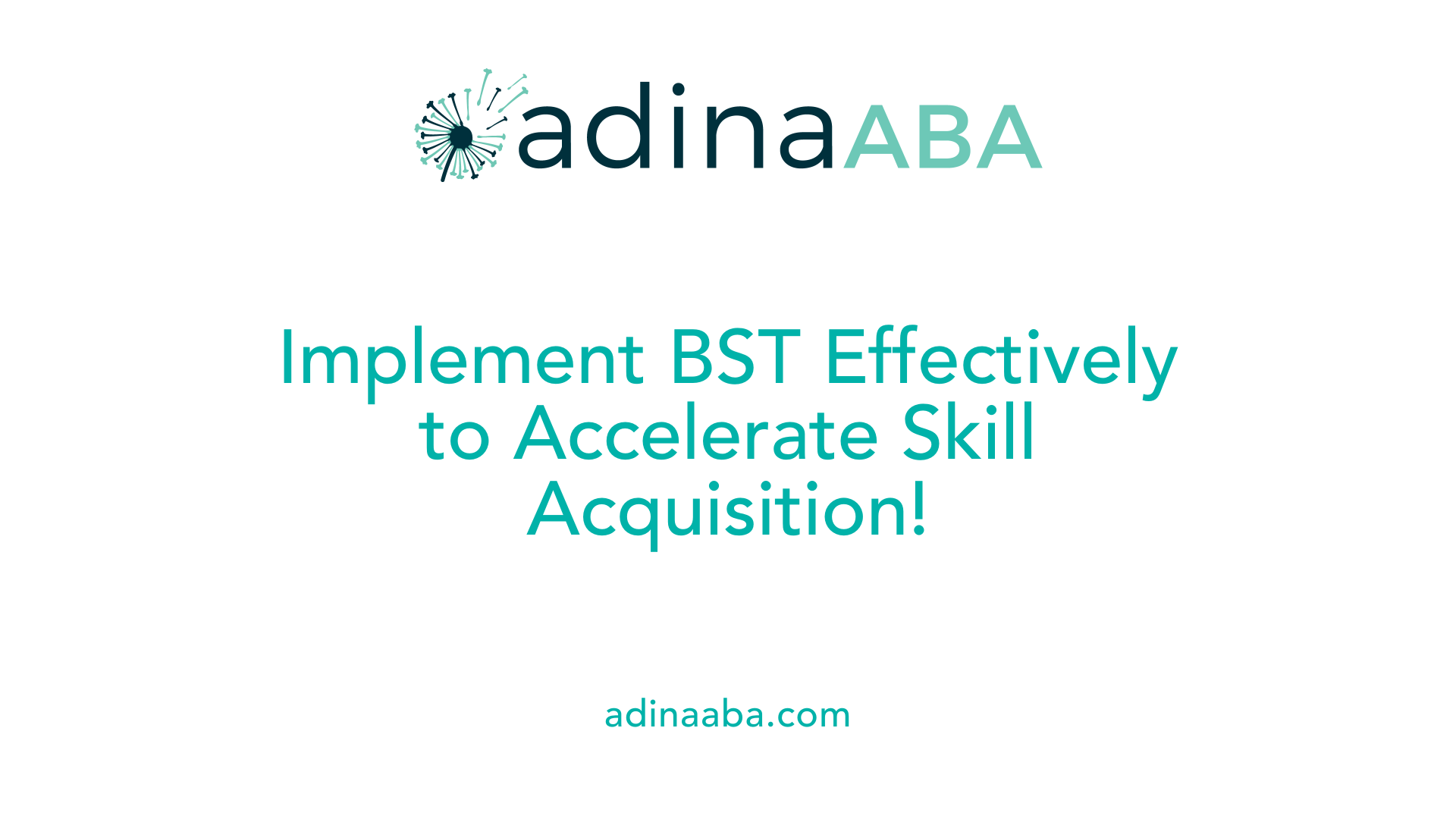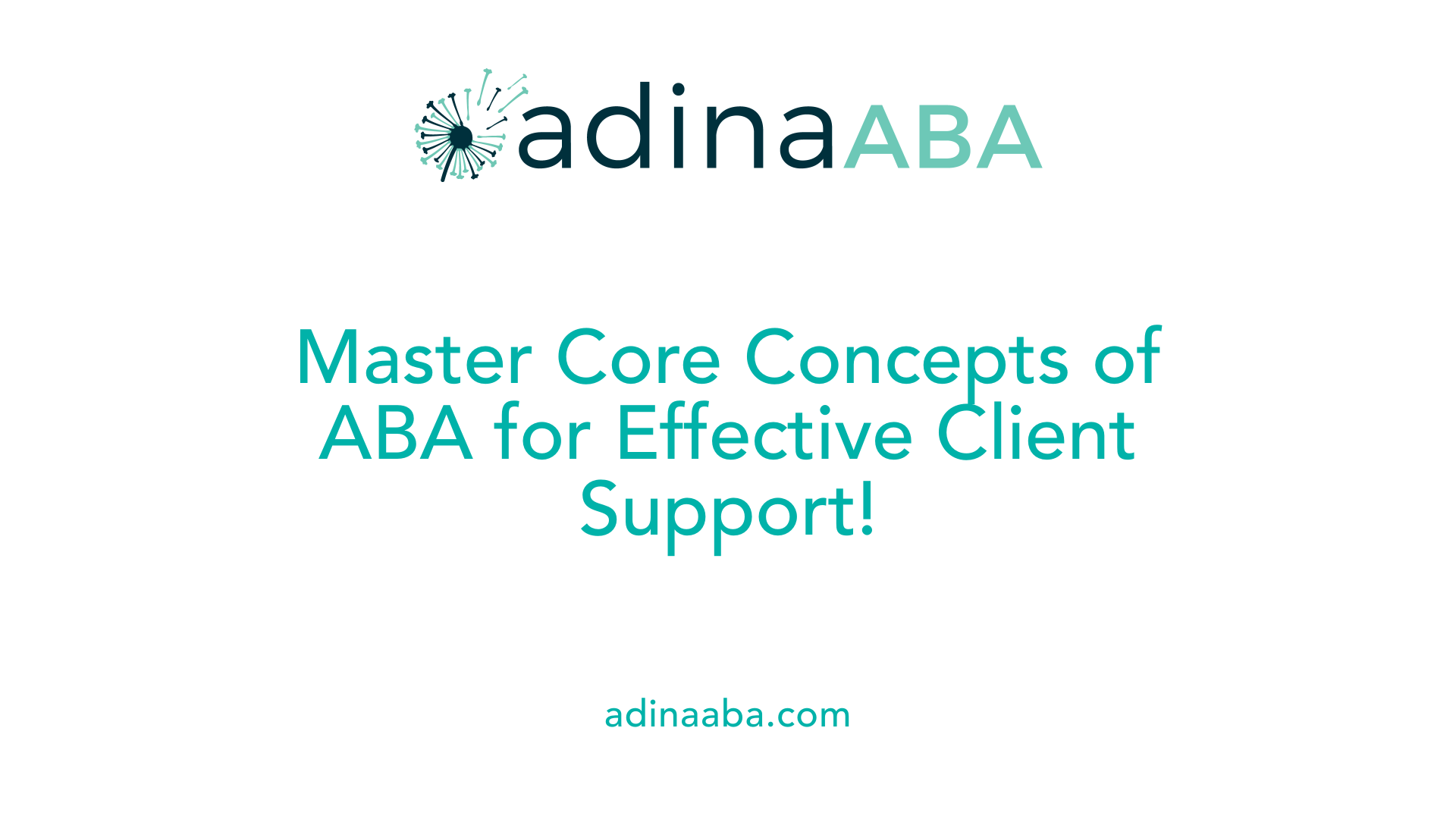Tips for training new ABA therapists

Laying the Foundation for Successful ABA Therapy Training
Training new ABA therapists is a multifaceted process that requires a structured approach, combining theoretical instruction with practical application. By implementing best practices such as Behavioral Skills Training (BST), organizations can ensure that therapists acquire essential skills effectively while maintaining high standards of care. This article outlines comprehensive strategies, including certification pathways, core training components, and ongoing professional development, to help aspiring ABA therapists thrive in their roles.
Implementing Behavioral Skills Training (BST) for Skill Acquisition

What are effective strategies for training new ABA therapists?
Training new ABA therapists effectively involves a comprehensive approach centered around the use of Behavioral Skills Training (BST). This method emphasizes four core components: instruction, modeling, rehearsal, and feedback.
In the instruction phase, trainers provide clear guidance and explain the reasoning behind each protocol. This helps therapists understand the purpose of each technique and builds a solid foundation for skill development.
Modeling follows, where experienced trainers demonstrate proper application of interventions. This visual example allows therapists to see the correct procedure, making it easier to imitate during rehearsal.
Rehearsal gives therapists the opportunity to practice the skills in real-time. Reinforcement is provided for approximations, encouraging gradual improvement and confidence.
Constructive feedback is crucial throughout this process. Trainers should start with positive observations and then offer specific, actionable suggestions for improvement. This supportive approach fosters motivation and accelerates learning.
Beyond BST, proficiency also depends on data collection and analysis. Therapists should be trained in collecting accurate data, understanding behavior functions, and using tools or software for automatic data tracking. Mastery of experimental designs, such as reversal and multiple baseline, is also essential to establish clear links between interventions and outcomes.
As the field advances, ongoing professional development is vital. This includes training in emerging technologies like telehealth and AI tools, adhering to standards from organizations like BHCOE, and staying up-to-date with evidence-based practices.
Through these combined strategies, new ABA therapists can acquire essential skills, uphold treatment consistency, and ensure positive results for their clients.
Foundations of ABA Therapy and Effective Training Content
 Understanding the core ideas behind Applied Behavior Analysis (ABA) is crucial for new professionals. ABA therapy revolves around fundamental principles like reinforcement, the ABC model (Antecedent-Behavior-Consequence), prompting, fading, and behavior chaining. These principles serve as the building blocks for designing effective, individualized treatment plans.
Understanding the core ideas behind Applied Behavior Analysis (ABA) is crucial for new professionals. ABA therapy revolves around fundamental principles like reinforcement, the ABC model (Antecedent-Behavior-Consequence), prompting, fading, and behavior chaining. These principles serve as the building blocks for designing effective, individualized treatment plans.
Training new therapists on these concepts involves a mix of hands-on guidance and practical applications. Combining observation, modeling, and role-playing allows learners to see these principles in action, making abstract ideas more tangible. For example, demonstrating how to effectively use positive reinforcement helps clarify its role in encouraging desirable behaviors.
Assessment techniques are equally important. Therapists must learn to gather data through methods such as Functional Behavior Assessment (FBA), skill assessments, and ongoing observation. This data informs intervention strategies and ensures personalized treatment plans are evidence-based and adaptable.
Intervention strategies encompass techniques like Discrete Trial Training (DTT), Natural Environment Teaching (NET), and Pivotal Response Training (PRT). Teaching these methods involves explaining their purpose, step-by-step procedures, and scenarios where each is most effective. Active practice, including role-playing scenarios with supervision, helps solidify understanding and skills.
Ethics form a core part of ABA training. New therapists should be educated on maintaining client dignity, acquiring informed consent, and practicing culturally competent care. Emphasizing ethical practice ensures interventions are respectful, effective, and aligned with professional standards.
Training should be ongoing, with continuous supervision and feedback from experienced Board Certified Behavior Analysts (BCBAs). Regular reviews of data, progress, and reflection help new professionals refine their skills. Including caregivers and team members in training promotes consistency across settings and enhances generalization of skills.
To ensure comprehensive learning, training programs often incorporate real-life videos, quizzes, and supervised practice. Such tools help bridge the gap between theory and practice, fostering confidence and competence in new ABA therapists.
| Concept | Description | Application Example |
|---|---|---|
| Reinforcement | Increasing behaviors through rewards | Praising a child for trying to communicate |
| ABC Model | Understand antecedents, behaviors, and consequences | Analyzing triggers for tantrums |
| Prompting & Fading | Guiding behavior and gradually decreasing assistance | Using physical prompts then fading to gestures |
| Behavior Chaining | Linking simple behaviors into complex sequences | Toothbrushing through step-by-step prompts |
| Assessment Methods | Techniques like FBA, skill assessments | Identifying environmental triggers for behaviors |
| Intervention Techniques | DTT, NET, PRT | Teaching communication skills across settings |
| Ethical Standards | Respect, consent, cultural competence | Ensuring respectful interactions and privacy |
By integrating these foundational principles with experiential learning and ongoing mentorship, new ABA practitioners develop the competence and confidence needed to support children with autism successfully.
Certification and Skill Development Pathways
 Becoming a proficient ABA (Applied Behavior Analytic) therapist involves meeting specific educational and experiential requirements, obtaining relevant certifications, and developing essential professional skills.
Becoming a proficient ABA (Applied Behavior Analytic) therapist involves meeting specific educational and experiential requirements, obtaining relevant certifications, and developing essential professional skills.
Educational Requirements typically include at least a high school diploma, but many positions and certifications prefer or require college-level coursework. For advanced roles, a bachelor’s or master’s degree in psychology, education, or behavior analysis is often necessary. Completing coursework related to behavior principles, ethics, data collection, and intervention strategies lays a strong foundation.
Certification Exams are crucial milestones in this process. The three primary certifications are RBT® (Registered Behavior Technician), BCaBA® (Board Certified Assistant Behavior Analyst), and BCBA® (Board Certified Behavior Analyst). Each has distinct eligibility criteria for education and supervised experience and involves passing a comprehensive exam. The exams assess knowledge of ABA principles, ethical practices, and intervention techniques.
Supervised Experience is integral to certification. For example, aspiring BCaBAs and BCBAs must accrue documented supervised hours in clinical settings. This hands-on training ensures practitioners can reliably implement intervention strategies, track progress, and adapt techniques to the individual needs of clients.
Professional Skills such as strong communication, observation and analytical skills, patience, and empathy are essential. Effective ABA therapists also need organizational abilities, problem-solving skills, and adaptability to diverse situations. Continual professional development through workshops, seminars, and additional coursework supports both skill enhancement and certification renewal.
| Certification | Educational Prerequisites | Supervised Hours | Examination | Focus Area |
|---|---|---|---|---|
| RBT® | High school diploma | 40 hours of training | Yes | Direct implementation, data collection |
| BCaBA® | Bachelor’s degree in behavior analysis or related field | 1000 hours supervised fieldwork | Yes | Intermediate ABA skills, designing interventions |
| BCBA® | Master’s degree in behavior analysis, psychology, or related field | 1500 hours supervised fieldwork | Yes | Advanced intervention, supervision, ethics |
Professionals seeking to pursue a career in ABA should regularly participate in relevant educational workshops, seek mentorship, and stay updated with the latest research and guidelines.
More Information: To explore detailed paths and requirements, searching "ABA certification paths and requirements" provides comprehensive resources and guidance for prospective practitioners.
Early Stages Expectations and Building Competence
What should new ABA therapists expect and how can they succeed in their initial stages?
When beginning ABA therapy, new therapists will start with comprehensive assessments. This process involves observing the child's behavior, engaging with caregivers, and conducting various tests to understand the child's unique skills and challenges. These assessments help in creating tailored treatment plans that focus on specific developmental goals.
Building a strong, trusting relationship with the child is crucial. Therapists should use positive reinforcement, playful activities, and engaging strategies to foster comfort and cooperation. Developing rapport ensures the child feels safe and motivated throughout therapy.
Implementing structured routines within sessions helps organize activities and manage behavior effectively. Typically, these routines include a warm-up phase, targeted skill-building tasks, and consistent data collection to track progress over time.
Family involvement plays a vital role. Therapists should collaborate with caregivers by providing guidance on reinforcement strategies at home, explaining the therapy goals, and encouraging active participation. This partnership helps generalize learned skills across different settings.
Success during the initial phase depends on setting clear, achievable goals, receiving ongoing supervision, and maintaining flexibility to adapt techniques based on how the child responds. Patience, consistency, and a compassionate, child-centered approach are essential qualities for new therapists to develop confidence and achieve positive developmental outcomes.
Creating a Supportive Environment for Therapists and Clients
How can I prepare for my first ABA therapy session as an RBT?
Preparing for your initial ABA session as a Registered Behavior Technician (RBT) involves several important steps to ensure a successful and smooth experience. First, review all relevant information about the child and familiarize yourself with the personalized treatment plan developed by the supervising BCBA. This plan outlines specific goals, preferred reinforcement strategies, and intervention procedures, helping you understand what is expected.
Next, gather and organize therapy materials, such as visual aids, social stories, and any necessary data collection tools. Practicing the implementation of tasks and procedures beforehand can boost your confidence. It’s helpful to create a calming, familiar environment by bringing familiar items from home and setting up a dedicated, organized space for sessions.
Visual supports, like pictures and schedules, play a crucial role in helping children understand what will happen during therapy. Preparing a visual schedule for the session can set clear expectations and reduce anxiety. Additionally, practicing brief separation techniques at home can help the child feel more comfortable with routines and reduce stress associated with separation.
Collaborate closely with the child’s family and your supervising BCBA to establish positive expectations and clarify your role. Building rapport from the start is essential—approach the child with patience, a positive attitude, and engaging activities. Keeping open communication ensures that the session aligns with the child's individual goals and preferences, fostering a trusting relationship.
Finally, maintaining a flexible yet structured session plan, along with a supportive and encouraging demeanor, sets a foundation for progress. Remember, consistent preparation and a compassionate approach are vital to creating a positive experience for both the child and yourself.
Professional Development and Continual Growth in ABA

How can I improve training methods and professional development in ABA therapy?
Enhancing training methods and ongoing professional development in ABA involves incorporating proven strategies such as Behavioral Skills Training (BST). BST integrates four critical components: clear instruction, modeling behaviors, rehearsal of skills, and constructive feedback. This approach ensures therapists not only learn new techniques but also master them through practice and refinement.
Regular ongoing supervision is vital. Supervisors observe sessions, provide tailored feedback, and guide therapists through challenges, fostering continuous improvement. Additionally, consistent assessment and personalized development plans help identify areas for growth.
Pursuing advanced certifications like Behavior Analyst Certification Board’s (BACB) credentials—such as BCBA or BCBA-D—solidifies a therapist’s expertise. These certifications require extensive coursework, supervised experience, and successful exams, creating a strong knowledge foundation.
To stay current, engaging in continuing education—through workshops, conferences, and seminars—is essential. Advances in technology can also be integrated into training, employing video modeling, online modules, and interactive simulations to enhance learning.
Personalized intervention strategies tailored to individual needs—especially in teaching social skills or managing challenging behaviors—improve outcomes. Using tools like social stories, video modeling, and data-driven decision-making ensures interventions remain effective.
Finally, fostering a culture of lifelong learning, utilizing diverse training formats, and encouraging reflective practice help therapists evolve professionally. Combining structured training programs with real-world application maximizes growth and accelerates skill mastery in ABA therapy.
Building Relationships with Families and Supporting Effective Parent Training

How does parent training support ABA, and how can therapists work effectively with families?
Parent training is a fundamental part of ABA therapy. It helps children with autism develop skills in various settings and ensures that learned behaviors are practiced consistently across environments. When parents are actively involved, the progress children make in therapy is more likely to generalize to everyday life.
Effective parent training involves practical, hands-on strategies. Therapists teach parents how to create visual schedules, utilize positive reinforcement, and handle challenging behaviors with consistent responses. Role-playing different scenarios helps parents gain confidence and apply techniques effectively.
Maintaining open, ongoing communication between parents and therapists is vital. Techniques such as daily check-ins, visual supports, and teaching children to use clear language or visual aids foster understanding and cooperation. Additionally, setting realistic and small, measurable goals keeps everyone motivated, providing a sense of achievement and progress.
Building a collaborative relationship means sharing observations, involving parents in training sessions, and offering resources that support at-home learning. This partnership creates a consistent, supportive environment that encourages children’s development outside of formal therapy, making progress more sustainable.
Fostering Excellence in ABA Training and Practice
Implementing comprehensive, evidence-based training strategies is essential for preparing competent, compassionate ABA therapists. Emphasizing ongoing education, supervision, and family collaboration enhances the quality of interventions and supports the developmental progress of children. Consistent professional development and mastery of core principles ensure therapists can adapt to evolving best practices, ultimately leading to better outcomes for the clients served.
References
- Therapist Training Tips - How to ABA - Shira & Shayna, BCBA's
- The Complete Guide to ABA Training Programs
- The Ultimate Guide to Parent Training in ABA
- What to Expect on the First Day of ABA Therapy: Preparations and Tips
- Mastering ABA at Home: Essential Parent Training Tips | Childwise
- How to Become an ABA Therapist: A Step-by-Step Guide | Motivity
- How to Effectively Train New Hires for ABA Therapy Positions - CMG
- Creating a Positive Onboarding and Training Experience to Retain ...
- Behavioral Strategies to Improve Your Onboarding Process
More Resources
Expert Clinicians
Get started today ->



.jpg)
.jpg)
.jpg)
